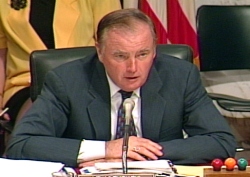"ONE OF THE CLEAREST LESSONS OF THE PUERTO RICO POLITICAL STATUS PROCESS IS THAT CLARIFYING HALF-TRUTHS TAKES MORE EFFORT THAN TELLING THE HALF-TRUTHS IN THE FIRST PLACE."
"Dr. Antonio Fernós argues that resolution of Puerto Rico's status is a matter ruled primarily by international law and conventions rather than the U.S. constitutional and political process.
"Simply put, international doctrines are not the law of the land in the U.S., including Puerto Rico, unless recognized by the U.S. and implemented through the federal political process. Moreover, the U.S. has never recognized any doctrine or ratified any treaty or convention which eliminates the authority of the U.S. Congress to determine the "civil rights and political status" of the inhabitants of Puerto Rico pursuant to Article IX of the Treaty of Paris and the Territorial Clause.
"Finally, being from a U.S. unincorporated territory with permissive citizenship and a political status defined by Congress under the Territorial Clause is not a form of "slavery" as Dr. Fernós asserts. Rather, the people of Puerto Rico have consented to internal self-government under a local constitution in 1952, but have not achieved equal rights to participate in the political process through which the supreme law applicable to Puerto Rico is made. To cure this inherently defective status, the people of Puerto Rico have the right to exercise their inherent sovereignty in favor of becoming a state of the union, or to go outside the U.S. constitutional system as an independent nation.
"That is what the current status proposals before Congress will make possible." Herbert W. Brown III, President, Citizens Educational Foundation, June 22, 1998
|
Kudos to Republican U.S. Sens. Wayne Allard and Ben Nighthorse Campbell, both of Colorado, for co-sponsoring a measure that would let Puerto Ricans determine their own future.
The island's voters long have needed an opportunity to weigh realistic alternatives to their commonwealth's nebulous status: not quite independent, not a state and more of a colony than anyone cares to admit.
A plebiscite held five years ago offered only an unrealistic alternative. The 1993 vote was a charade, not a measure of the Puerto Rican people's will.
By contrast, the measure now backed by Allard, Campbell and others, S. 472, doesn't automatically confer statehood to Puerto Rico. Instead, it realistically outlines the island's choices: statehood, independence or functioning as an unincorporated U.S. territory under Congress' jurisdiction. Denver Post, Editorial, 6/13/98
DALLAS (AP) - Gov. George W. Bush, accompanied by House Speaker Gingrich, the outspoken Georgia Republican, stressed education and family values to members of the League of United Latin American Voters on Wednesday.
The Hispanic population has grown rapidly, especially in a few large states, and the number of Hispanics registered to vote has increased by one-third this decade.
"Obviously the Republicans know the importance of the Hispanic vote," said Hector Flores, a vice president of LULAC. "But right now because of the political agenda and latest assaults of the Republicans, they need to earn our trust."
Bush, who is seeking another term this fall but is considered a potential presidential candidate in 2000, said neither party should take Hispanic voters for granted.
"The Hispanic vote is important today, and it's going to be really important tomorrow," he said. "Candidates such as myself must go out to the barrios and knock on doors, and that's what I plan to do."
|

"In all fairness, I do think that the voters in Puerto Rico need to understand that choosing separate sovereignty will in all likelihood result in some curtailment of citizenship. Some future Congresses will obviously deal with that but I seriously doubt that we would embrace dual citizenship." Chairman Frank Murkowski, (R-AK), presiding at the senate oversight hearing on issues raised by Puerto Rico separate sovereignty and independence status options.
The record before Congress is now clear that permanent union and irrevocable U.S. citizenship can not be obtained through commonwealth, even if it is reformed as proposed in the 1993 commonwealth definition. Since only statehood provides the constitutionally guaranteed status and citizenship included in the commonwealth definition, the real question arising from the 1993 referendum results is how those who voted for commonwealth with permanent union and irrevocable U.S. citizenship intend to achieve that result if not through statehood.
Quote: "This is a bill to let the Puerto Rican people decide what they want to do. . . . what our relationship with the United States is going to be." Jos A. Rivera, national chairman, Republican National Hispanic Assembly
The 3.8 million people on an island south of Florida cannot vote for their nation's president. They serve in the military but are subject to federal laws they have no hand in writing.
Cuba, you say? No, it's the Commonwealth of Puerto Rico, U.S. territorial possession, and its residents, who are citizens of the United States, haven't missed the irony.
"We . . . champion democracy throughout the world, yet in our own backyard . . . we have not let the people of Puerto Rico make up their minds as to what they want to be," says Jos F. Nio, president of the U.S. Hispanic Chamber of Commerce.
With the help of some fair-minded legislation, that ought to change.
The House of Representatives passed a bill in March providing a plebiscite for Puerto Ricans to vote their choice between continuing commonwealth status, statehood or independence.
The Senate version is awaiting action by the Energy and Natural Resources committee. Sen. Frank H. Murkowski, R-Alaska, chairman, should move the bill to the floor for a vote. It's time for the United States to get out of the colony business. Portland Oregonian, Editorial, 6/20/98
|

